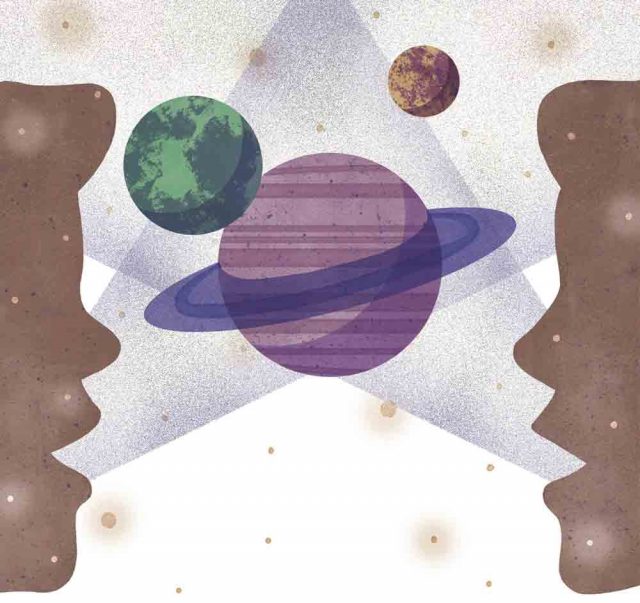The Script of Ignorance
We all know the lists, the if-onlys, the whens: when I go to college, if only I had a job, when I get married, if only I had or didn’t have children, when the kids go to college, when I get divorced, if only I had enough money, when I retire, etc. Although happiness has never appeared before in any stable or enduring way, we harbor the recurring, unreflective thought that when our desired conditions are met, then happiness will be lastingly mine. Such is our ignorance talking. Its script is handed to it by craving. We can see the endless cycling, the entrapment, the binding.
From Unbinding: The Grace Beyond Self, by Kathleen Dowling Singh © 2017. Reprinted with permission of Wisdom Publications (wisdompubs.org). Kathleen Dowling Singh is a dharma practitioner, speaker, and teacher. She is the author of The Grace in Aging and The Grace in Living.
A Life in Gratitude
The quality of our life is determined by our mind’s response to the circumstances of our life. It is not determined directly by the circumstances. We make the mistake of trying to produce happiness and meaning by controlling circumstances, mistakenly thinking that they are the primary cause. In the old texts, this is referred to as “beating the cart to make the horse move.”
The more we are attached to this approach, the more vulnerable we become to anxiety, because there is no certainty that we can attain or produce the proper circumstances. And if we do produce the proper circumstances there is no certainty that they will endure, and so our emotions are constantly destabilized.
The pursuit of circumstances as the goal in life has an important corollary— that we, just as we are, are insufficient and unsatisfied, and that only through accomplishing certain things with our lives do we fulfill or justify our being here. This error is the source of constant stress, and it also makes no sense. And this is why society finds young people, even those in the upper classes, breaking under this horrible burden—abusing drugs and alcohol, cutting themselves, and even committing suicide, because their operating system is so divorced from reality, from genuine sanity.
Since this is the culture of our society— that meaning comes from wealth, status is in the eyes of others, and love is dependent on performance, and so on— one needs great courage to go against the current. The wisdom that says these goals are meaningless in the face of our temporary stay here is hidden in our culture. The grace of a gentle, noble spirit is not valued. The fact is that every day we are gifted with the incredible present of a body and mind, and a universe that supports our life. Instead of living in deep gratitude, people take that for granted and go off on egotistical binges; this is a sign of the darkness of our time.
And it is all so simple—wake up with a profound “Thank you” and cultivate that mood as much as possible.
By Yoshin David Radin, founder and abbot of the Ithaca Zen Center. He lives in Spencer, New York.
A View of Our Friends
Instead of viewing them as our necessary companions, we increasingly view friends as sources of entertainment and lovers as providers of sensual pleasure. Unfortunately, the amount of sensual gratification or entertainment any human being can provide another is ultimately ephemeral. If a connection with another being is based primarily on the entertainment or distraction it provides, the relationship is like candy; it tastes good but it won’t nurture or sustain us.
From Unsubscribe: Opt Out of Delusion, Tune In to Truth, by Josh Korda © 2017. Reprinted with permission of Wisdom Publications (wisdompubs.org). Josh Korda is the guiding teacher of the meditation and dharma community Dharma Punx NYC and a visiting teacher at Against the Stream Buddhist Meditation Society.
Transforming Our World Begins Within
Inside each of us is a complex constellation of perceptions, ideas, feelings, and intentions that mutually affect one another. Our inner worlds interact with outer conditions to shape the world around us. We respond to external circumstances, but we also create them. In other words, our inner worlds and the outer world are intimately connected, and that interconnection is part of interdependence as well. Recognizing the full extent of interdependence will lead to a fundamental rethinking of who we are as human beings and of our place in the world we help create.
Our inner world is the pivotal domain for bringing about real change in the world that we all share. Neither social nor environmental justice is possible without significant changes in our attitudes and the intentional behavior they give rise to. The transformation of our social and material world must begin within us.
From Interconnected: Embracing Life in Our Global Society, by The Karmapa, Ogyen Trinley Dorje © 2017. Reprinted with permission of Wisdom Publications (wisdompubs.org). Karmapa Ogyen Trinley Dorje is one of the two claimants to the title and role of 17th Karmapa, the head of the Karma Kagyu lineage in Tibetan Buddhism.

Cool That Reactivity
Everyone is looking for someone to blame, and therefore aggression and neurosis keep expanding. Instead, pause and look at what’s happening with you. When you hold on so tightly to your view of what they did, you get hooked. Your own self- righteousness causes you to get all worked up and to suffer. So work on cooling that reactivity rather than escalating it. This approach reduces suffering—yours and everyone else’s.
From The Compassion Book, by Pema Chödrön © 2017. Reprinted with permission of Shambhala Publications (shambhala.com). American Buddhist nun and bestselling author Pema Chödrön is the principal teacher at Gampo Abbey in Nova Scotia.
Working Through Suffering
Working through our current hardships gives us the courage to triumph over future ones. For anyone working to become more courageous, suffering can become an ideal source of growth. An indolent life without hardship of any kind is just like an empty ship, easily overturned by a storm.
From Tales for Transforming Adversity: A Buddhist Lama’s Advice for Life’s Ups and Downs, by Khenpo Sodargye © 2017. Reprinted with permission of Wisdom Publications (wisdompubs.org). Khenpo Sodargye Rinpoche is a Tibetan Buddhist lama, scholar, and teacher in the lineage of Khenpo Jigme Phuntsok, founder of the renowned center Larung Gar.

Monks and Robbers
When I lived at the monastery, I occasionally practiced with a group of monks in the Thai forest tradition. Some of these monks were British, and though monks don’t traditionally eat after noon, these British guys not surprisingly had found a loophole for afternoon tea. So, one afternoon over chocolate and Earl Grey, they told a story about a pilgrimage they’d been on through India together. While they were heading to Delhi, bandits hijacked the bus and began stealing the passengers’ wallets at knifepoint. Thai Forest monks never touch money. They beg for all their food. And when the bandits got to these orange-robed bald men, some of the novice monks were afraid. But one of the elder monks walked directly up to a robber, pointed at the knife, and then, as if in an episode of Game of Thrones, he bared his neck, daring the man to slice. The robbers fled.
From All Our Waves Are Water: Stumbling Toward Enlightenment and the Perfect Ride, by Jaimal Yogis © 2017. Reprinted with permission of HarperCollins (harpercollins.com). Jaimal Yogis is an award-winning journalist and the author of Saltwater Buddha and The Fear Project. He teaches meditation, mindfulness, and creative writing at Spirit Rock, Kripalu, and Writing Pad.
Expanding Stillness
The Buddha insisted that the monk should train himself to meditate equally well in four formal postures: sitting, walking, standing, and lying down. Likewise, a modern meditator is perfectly capable of attaining body-mind stillness (passaddhi), bliss (piti), and deep contentment (sukha) while walking or standing. Feeling inwardly still while physically moving is not an oxymoron. Athletes call this “dynamic balance,” and it is a defining characteristic of flow states.
Once the monk had perfected body-mind stillness in each of those four standard postures, he was then instructed to expand that quality into every activity.
The Buddha gave a few examples: getting dressed, eating, bathing, urinating, and defecating. We don’t usually think of urinating as an activity suitable for meditation, but the Buddha really did mean it. The development of inner balance, bodily comfort, mental stillness, and self-observation should not be confined to the ghetto of a formal exercise.
From The Foundations of Mindfulness: How to Cultivate Attention, Good Judgment, and Tranquility, by Eric Harrison © 2017. Reprinted with permission of The Experiment, LLC (theexperimentpublishing.com). Eric Harrison began teaching meditation in New Zealand as a secular, science- based therapy in the 1980s. He has written seven books on meditation and mindfulness.
Thank you for subscribing to Tricycle! As a nonprofit, we depend on readers like you to keep Buddhist teachings and practices widely available.
